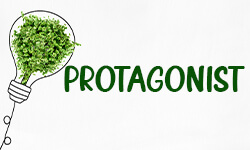
Countless people search for the meaning of English words and phrases, but frequently they use popular words without knowing their true definitions or origins. Occasionally, they even misspell words, which is a fatal error in academic writing. This article is here to help clarify the term “protagonist,” including its correct spelling and use in a sentence. We will also take a look at the word’s origin and why the word is written the way it is.
Definition of “protagonist”
A “protagonist” is the main character or leading figure in a story, novel, play, movie, or any other narrative. The protagonist is typically the central character around whom the plot revolves, and their actions and experiences drive the storyline. The term is often associated with characters who undergo significant development or face challenges and conflicts that form the core of the narrative. The protagonist is not necessarily a “hero” in the traditional sense; they can be complex individuals with both positive and negative qualities.
Use of “protagonist” in a sentence
“Protagonist” is used in English as a noun. It refers to the main character or central figure in a literary work, such as a novel, play, or movie. The protagonist is typically the character around whom the story revolves, and their actions and experiences drive the narrative forward. The term is widely used in literary analysis and discussions about storytelling to identify and analyse the primary character in a work.
How to spell “protagonist” correctly
The word “protagonist” has its origins in the Greek language. When combined, “protagonist” essentially means the “first actor” or the “primary character” in a narrative. The term has been borrowed from Greek into Latin and, subsequently, into English, where it is widely used in literary contexts to refer to the main character around whom the story revolves.
- “Protos” – meaning “first” or “primary”
- “Agonistes” –meaning “actor” or “competitor”
Correct spelling
protagonist
Wrong spelling
protaganist
protagonst
protagnist
If one is not familiar with the correct spelling or pronunciation of “protagonist,” they may rely on phonetics, leading to misspellings. It’s a common error, but awareness and attention to the correct spelling can help avoid further mistakes.
Synonyms for “protagonist”
Using synonyms of “protagonist” can help diversify language, improve communication clarity, prevent repetition and redundancy, customize language for different audiences or situations, and enhance stylistic diversity in writing. The following sentences contain four alternative words for “protagonist” along with examples.
| Synonym | Examples |
| Central figure | The decisions of the protagonist significantly influence the course of the story. |
| The decisions of the central figure significantly influence the course of the story. | |
| Hero/heroine | The protagonist displayed great courage in the face of adversity. |
| The hero/heroine displayed great courage in the face of adversity. | |
| Lead | The protagonist of the play delivered a powerful monologue that captivated the audience. |
| The lead of the play delivered a powerful monologue that captivated the audience. | |
| Main character | The protagonist, embroiled in a complex plot, navigates through various challenges. |
| The main character, embroiled in a complex plot, navigates through various challenges. |
FAQs
A “protagonist” is the main character or leading figure in a story, typically the one with whom the audience or readers are meant to identify. The protagonist is often the central character around whom the plot revolves, and their journey or experiences drive the narrative.
An “antagonist,” on the other hand, is a character or force that opposes or conflicts with the protagonist. The antagonist creates obstacles and challenges for the protagonist, contributing to the overall conflict in the story. While the protagonist is usually the character with whom the audience sympathizes, the antagonist is designed to create tension and provide a source of opposition or conflict.
A protagonist should typically possess the following characteristics:
- Relatability
- Development
- Clear motivations and goals
- Well-rounded
- Central role
Yes, a protagonist can be portrayed as morally ambiguous or even evil, challenging traditional notions. In such cases, the story might offer a perspective that explores the complexity of characters and challenges conventional expectations of heroes.
numerous advantages for Canadian students:
- ✓ 3D live preview of your configuration
- ✓ Free express delivery for every order
- ✓ High-quality bindings with individual embossing

